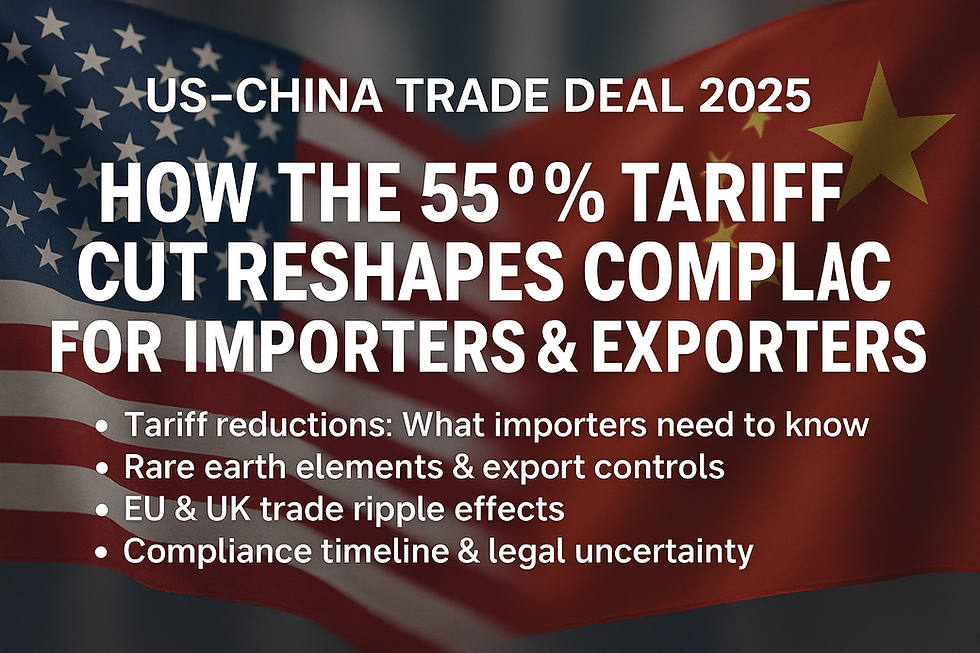US-China Deal: 55% Tariff Cut Impact
- Madni Laghari

- Jul 6, 2025
- 4 min read
Breaking down the new US-China framework and what it means for your Trade Compliance strategy moving forward.
In the rapidly evolving world of international trade, the latest US-China trade agreement represents a pivotal moment for Customs professionals and compliance officers worldwide. As we navigate this complex landscape of reduced tariffs, new Export Controls, and rare earth element diplomacy, understanding the implications becomes crucial for maintaining competitive advantage while ensuring full compliance.
Top Tips for Readers
Top Tip 1: You can break down a paywall by becoming a Premium plan subscriber.Top
Tip 2: Subscribe to our free newsletter for weekly customs cost-saving tips, compliance updates, and invites to live trainings: www.customsmanager.info
Key Questions Covered in This Blog
How will the 55% tariff reduction impact your Import Regulations strategy?
What new Export Compliance requirements emerge from the rare earth elements provision?
How should EU and UK businesses prepare for ripple effects from US-China trade changes?
What timeline considerations affect your current Customs procedures?
Which sectors face the biggest compliance challenges under the new framework?
How do the new tariff structures affect cost calculations for importers and exporters?

How will the 55% tariff cut impact your Import Regulations strategy?
The reduction from 145% to 55% tariffs represents more than just numbers on a spreadsheet—it’s a seismic shift. Your current Import procedures, duty optimization strategies, and cash flow models were designed around much higher rates.
Now, with the 55% structure comprising:
10% baseline (currently under legal challenge),
25% Trump-era tariffs, and
20% fentanyl-related tariffs,
importers must execute precision classification and valuation. Leading companies are already revalidating their HS Codes, mapping tariff risk zones, and preparing for unpredictable court outcomes.
What new Export Compliance requirements emerge from the rare earth elements provision?
China’s pledge to supply rare earth elements (REE) to the U.S. is more than economic—it’s geopolitical. These materials are dual-use, critical to semiconductors, electric vehicles, and defence systems.
From a compliance perspective:
US exporters must prepare for enhanced monitoring
EU/UK importers may face additional documentation
Supply chains will need to treat REEs as strategic goods, not just raw materials
What’s worrying is the ambiguity. Without concrete verification mechanisms, companies are left navigating grey areas. That's a compliance minefield.
Get Weekly Game-Changing Updates with The Customs Watch USA
Stay ahead of rapidly changing trade policies with exclusive insights from The Customs Watch USA. Our magazine cuts through political rhetoric to deliver actionable Customs intelligence that protects your bottom line. Sign up for email updates at www.customsmanager.info.
How should EU and UK businesses prepare for ripple effects from US-China trade changes?
Global trade isn’t siloed. A US-China agreement reshapes the entire ecosystem.
EU manufacturers using REE-based inputs face tighter scrutiny if sourcing from China
UK businesses, operating post-Brexit, must navigate multiple regulatory frameworks
Expect clashes between US Export Controls and EU/UK trade policies
Solution? Conduct multi-jurisdictional compliance audits. Model trade flows and build systems that handle conflicting requirements. Your customs consultant should now be part of strategic planning, not just operations.
What timeline considerations affect your current Customs procedures?
Time is tight. With tariffs possibly taking effect within days, and the July 8th pause deadline looming, your Customs procedures need immediate adaptation.
Key risks include:
Outdated tariff software
Incomplete declarations
Contract misalignments
We recommend scenario modeling: one plan for early implementation, one for delays, and one for last-minute legal reversals. Trade waits for no one—your systems must move faster than policy.
Which sectors face the biggest compliance challenges under the new framework?
Retailers, sourcing heavily from China, will face cost vs. compliance dilemmas. Small businesses, lacking expert customs teams, risk unintentional non-compliance.
Technology and manufacturing sectors—especially those using REE—must treat sourcing as a strategic compliance issue. You’re not just buying raw materials. You’re navigating trade war terrain.
How do the new tariff structures affect cost calculations for importers and exporters?
The 55% tariff rate isn’t one number—it’s three layers with legal uncertainties. Cost modeling is now complex:
Importers must map out how each component applies per product line.
Exporters face reciprocal tariff scrutiny—especially in China, where compliance inspections are expected to increase.
If you're not modeling for all scenarios, you’re risking margin loss—or worse, enforcement actions.
Arne’s Takeaway
The US-China framework is a mixed bag: it’s a political win, but a compliance challenge. The smartest businesses are already stress-testing systems, auditing procedures, and planning for every outcome—including the ones we haven’t seen yet.
Don't wait for customs chaos. Prepare now.
🛠️ Expert Recommendations
Upgrade your compliance systems to handle multi-layered tariff structures
Run a rare earth export risk assessment
Diversify supply chains for REE and tariff-sensitive inputs
Use professional customs advisors to model jurisdictional conflicts
Audit all supplier contracts and incoterms under the new deal structure
🔗 Sources & Further Information
Al Jazeera: "What do we know about the US-China trade deal?" (June 11, 2025)
US Commerce Secretary Howard Lutnick statements on trade framework
Main Street Alliance public statement on tariff impacts
Market analysis from Wedbush Securities and Economic Policy Institute
Customs Manager Consultations
📞 Fancy a Call?
Need help modeling how this deal affects your customs or export strategy? Book a free expert call now:👉 www.customsmanager.org → Book Expert Call
Want Weekly Compliance Wins?
Sign up for The Customs Watch USA & EU—exclusive updates, compliance tips, and sector analysis:👉 www.customsmanager.info
Disclaimer
This blog is for educational purposes only. For legal advice regarding your specific trade matters, always consult qualified customs, legal, or export control professionals.
Hashtags
#CustomsCompliance #TradeCompliance #ExportCompliance #ImportRegulations #USChinaTrade #CustomsConsultant #ExportControls #TariffReduction #TradeWar #InternationalTrade #CustomsManager #ComplianceOfficer #ImportExport #TradePolicy #CustomsTraining #SupplyChain #TradeConsulting #CustomsAdvice #RegulatoryCompliance #GlobalTrade #CustomsExpert #TradeDeal #CustomsNews #ExportImport #TradeStrategy











Comments